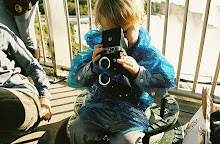Maine and lilacs.


cosmopolitan: adj. 1. belonging to all parts of the world; not limited to any one country or its inhabitants; widely spread. 2. Free from national or local prejudices; feeling at home in any part of the world.
Cosmopolitan: n. a cocktail of vodka, triple sec and cranberry juice with sweetened lime juice.
Interviewer to Sofia Coppola: "Hiroshima, Mon Amour?"
Coppola: "You know, I love the title, but I’ve never seen it."
Lyotard: "The absolutely other is not the other of a same, its other, in the heart of that supreme sameness that is being; it is other than being."
Both Hiroshima, Mon Amour and Lost in Translation are ninety minute(ish) long films; both were shot (mostly) on location in Japan; both begin with close-ups of the body; both are "classic romances" with a twist; both romances are adulterous and otherwise taboo, time-bound, and epiphany-inducing; both are written by a woman who spent years of her life in Asia; and both films went on to garner international praise from viewers and noteworthy awards committees alike. And yet, and yet. Hiroshima, Mon Amour was made about 40 years before Lost in Translation. In 1959 Alain Resnais and Marguerite Duras teamed up to make a film about the impossibility of making a film about the holocausts of WW2. Since that collaboration enough new world water has presumably passed under the bridge of History to enable Coppola to camp out in the posh Tokyo Park Hilton for a few months and to sneak around shooting the city in real film without any obligation to speak to the complicated relationship between her home country and her vacation location destination. Using Japan as wallpaper, allowing "Japan" to make an impression upon, rather than an argument within, her narrative, through the loosely autobiographical character of Charlotte, ("How narcissistic!" Coppola preemptively jests on the "making of" section of the Dvd), Coppola seductively blends apolitical solipsism with indignant cosmopolitanism to create a model (post)modern girl.
Immediately after the film was released in the small Floridian college town where I live, I began hearing rumors of manchildren singing Bryan Ferry songs at local Korean karaoke bars and of wall-eyed self-imagined starlets sadly stalking the bars in pale pink wigs. Around this time, I enrolled in a graduate class with a syllabus proposing that the class’s attendees would attempt to read most of Jean-Francois Lyotard’s oeuvre of criticism that has been translated into English. The class operated under the pretense of assessing Lyotard’s work with an eye to figuring out why his books remain largely unread in the States, despite the sexy association of his name with postmodernism, (due to his much-cited 1985 report on postmodernism), and regardless of his relative popularity in France. We read his difficult prose against a sequence of films that were not intended to illustrate the ever-evolving Lyotardian theoretical political project/s, (which would have betrayed Lyotard’s suspicion of what he calls "the figural" and of the dialectical procession of transparent dialogue), but to work in conjunction with this distrust of semiotic transmission. These films, made by the likes of Yvonne Rainer, Jonas Mekas, Jean-Luc Godard, and Werner Herzog, substantiated Lyotard’s obsession with enunciation and with the difficulties of language through their employment of jump-cuts, montage, translation, gaze-refusals, catharsis-withholding, and historically complicated landscapes boasting the undeniable junkyard of postwar postmodern continually colonial countries and cities.
I’d been looking forward to the fourth week of class, when we were scheduled to screen Hiroshima, Mon Amour. Although the film had come up in the Japanese classes I’d taken as an undergrad, none of my teachers had ever found the need to show or rigorously discuss it, and while I had watched the film more than once on my own, I always felt some mild discomfort with its blend of wartime atrocities and romantic love...

